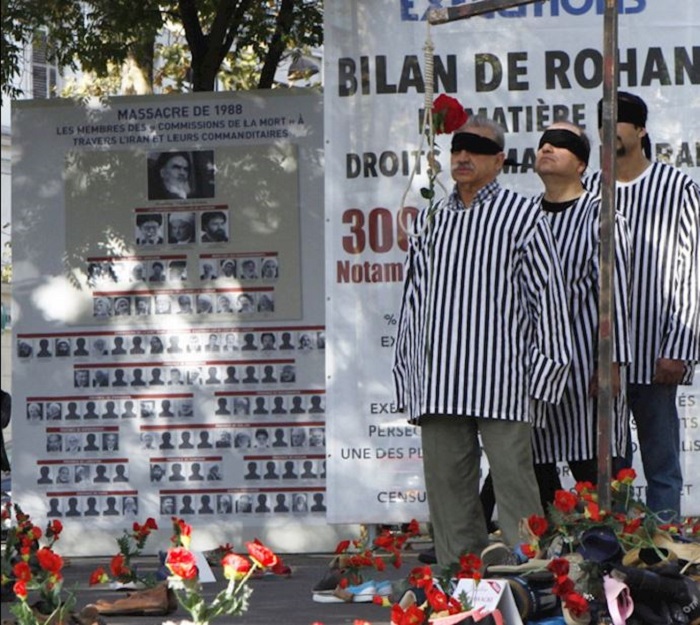
Iranian diaspora protest against the 1988 massacre in which 30000 MEK members and supporters were executed in Iran (file photo)
October 10 was World Day against the Death Penalty and this makes it the perfect time to reflect on the death penalty in Iran, for which Iran Human Rights Monitor’s (HRM) annual report has just been released.
There are hundreds of people in Iran that are sentenced to death every year, with thousands lingering on death row in Iranian jails, but the Iranian officials have never heeded the world’s calls to ban the death penalty.
Several independent international bodies, including the UN Special Rapporteur on Human Rights in Iran and Amnesty International, have said that Iran is the top executioner per capita, the second biggest executioner in terms of numbers, and the world leader in the executions of children and juvenile offenders.
Iran Human Rights Monitor notes that in 2019 alone, at least 200 individuals have been executed, including eight juvenile offenders, 10 women, and six political prisoners. At least 12 executions were carried out in public. More worrying still, this appears to be escalating, with at least nine women executed in just eight months, compared with an average of 6 to 10 per year from 2016 to 2018.
The Regime uses execution as a tool to suppress the Iranian people, most of whom live under the poverty line, are unemployed, and deprived of freedom of expression. They hardly make a secret of it. Supreme leader Ali Khamenei appointed notorious former judge Ebrahim Raisi, who was partly responsible for the massacre of 30,000 people in 1988, mostly members of the People’s Mojahedin Organization of Iran (PMOI, Mujahedin-e Khalq or MEK), as judiciary chief back in March to keep a lid on social unrest.
The US State Department deputy spokesman Robert Palladino denounced Raisi’s appointment as a “disgrace” and a “mockery of legal process”.
He tweeted: “Ebrahim Raisi, involved in mass executions of political prisoners, was chosen to lead Iran’s judiciary. What a disgrace! The regime makes a mockery of the legal process by allowing unfair trials and inhumane prison conditions. Iranians deserve better!”
While 160 countries have abolished the death penalty, Iran continues to execute people contrary to the standards required under international law and executes juvenile offenders, those with mental disabilities, and those who have not committed serious crimes (i.e. drug users, political activists). They also refuse to categorize murders according to their degrees, meaning that there is no leniency for manslaughter, self-defense, or domestic abuse victims.
Iran HRM wrote: “[We urge] all international human rights organizations, especially the High Commissioner for Human Rights and the Special Rapporteur on the situation of human rights in Iran, journalists and the media, to condemn horrendous executions in Iran and take immediate action to stop these medieval crimes being carried out in the twenty-first century. We want an Iran, free of any executions.”
In 1988, Khomeini, the founder of the mullahs’ religious dictatorship, penned the fatwa ordering the massacre of political prisoners. #1988Massacre #NoImpunity4Mullahs #InternationalDayoftheDisappeared #Iran pic.twitter.com/UiYKl4PmGP
— Maryam Rajavi (@Maryam_Rajavi) August 30, 2019
Staff Writer
